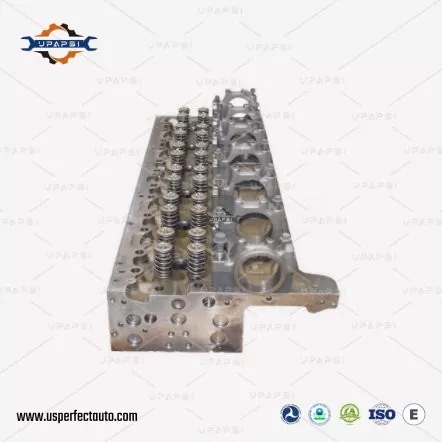Cylinder Head Care and Maintenance
2025-06-20
The cylinder head is a critical component of an internal combustion engine, playing a central role in sealing the combustion chamber, housing the intake and exhaust valves, and facilitating the passage of air and fuel. Proper care and maintenance of the cylinder head are essential for optimal engine performance, fuel efficiency, and longevity. Neglecting this component can lead to costly repairs, reduced engine power, and even complete engine failure.
Understanding the Cylinder Head
The cylinder head sits atop the engine block and seals the top of the combustion chambers. It contains crucial elements such as the valve train, spark plugs (in gasoline engines), and passages for coolant and oil. In some engines, the camshaft is also integrated into the cylinder head. Given its exposure to high temperatures and pressures, the cylinder head must be durable and well-maintained to withstand these harsh conditions.
Importance of Regular Maintenance
Routine maintenance ensures that the cylinder head remains in optimal working condition. One of the key maintenance tasks is regular oil changes. Engine oil lubricates moving parts in the cylinder head, such as camshafts and valves. Dirty or insufficient oil can lead to premature wear or damage. Similarly, maintaining the correct level and quality of engine coolant is crucial to prevent overheating, which can warp or crack the cylinder head.
Cleaning the air intake system and replacing air filters as needed also contributes to cylinder head health. Dust and debris entering the engine can cause carbon build-up in the cylinder head, leading to valve issues and reduced performance. In addition, periodic valve clearance checks and adjustments (as specified by the manufacturer) help maintain proper engine timing and combustion.
Common Issues and Their Prevention
One of the most common problems associated with the cylinder head is warping due to overheating. This can compromise the seal between the cylinder head and engine block, causing head gasket failure. To prevent this, it's essential to monitor the engine temperature and ensure the cooling system is functioning correctly.

Another potential issue is valve wear or failure. Regularly inspecting and replacing worn valve seals can prevent oil from leaking into the combustion chamber, reducing the risk of carbon deposits and oil consumption. It's also important to watch for symptoms of a failing cylinder head, such as engine misfires, white smoke from the exhaust, or loss of coolant without visible leaks.
Professional Inspection and Repair
While some aspects of cylinder head maintenance can be handled by knowledgeable vehicle owners, many require professional expertise. If symptoms suggest a serious problem, such as a cracked cylinder head or head gasket failure, it is advisable to consult a qualified mechanic. Pressure testing and machining may be necessary to restore the cylinder head to working order.
Conclusion
The cylinder head is vital to engine performance, and its care should not be overlooked. Through regular oil and coolant maintenance, periodic inspections, and prompt attention to symptoms of trouble, drivers can ensure the longevity and efficiency of their engine. Ultimately, proper cylinder head maintenance not only extends the life of the engine but also helps avoid expensive repairs and breakdowns.
As a professional manufacturer and supplier, we provide high-quality products. If you are interested in our products or have any questions, please feel free to contact us.


